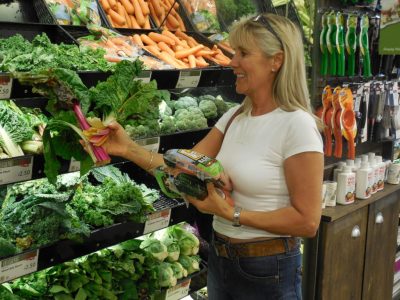Reading Food Labels To Avoid Toxic Ingredients

Reading Food Labels To Avoid Toxic Ingredients
When you go shopping, your first stop should be at the colourful aisle that is stocked with wonderful seasonal fruits and vegetables.
In this produce section, choose a wide variety of fresh fruit and vegetables – these are naturally low in fat, sodium and rich in cholesterol-lowering fibre. You can also choose frozen fruits and vegetables to have as a stand-by when there are times that you simply need something quick. If you buy ‘simple’ frozen vegetables without any sauces, they can be better choices than cans because they eliminate salt and that’s a must to control blood pressure and manage heart disease. When purchasing canned goods choose brands with no-added-salt.
Following a MACROVegan lifestyle means avoiding all animal foods to limit the amount of saturated fat, that’s the fat that comes from animals and hardens our organs. Be very careful to avoid trans fats, check the labels if it says partially hydrogenated or hydrogenated it contains trans fats. Trans fats can be found naturally at low levels in some foods, such as those from animals, including meat and dairy products. Artificial Trans fats can be formed when oil goes through a process called hydrogenation, which hardens the oil.
This type of fat, known as hydrogenated fat, can be used for frying or as an ingredient in processed foods. Much smaller amounts of artificial trans fats can also be made when oils are refined to make them fit to eat. Artificial Trans fats can be found in some processed foods such as biscuits and cakes where they are sometimes used to help give products a longer shelf life. Please also be aware of using products with Palm Oil. The industry is linked to major issues such as deforestation, habitat degradation, climate change, animal cruelty and indigenous rights abuses in the countries where it is produced, as the land and forests must be cleared for the development of the oil palm plantations.
Focus on plant-based protein like all sorts of beans and lentils, tofu, tempeh, seitan. These foods are fantastic sources of soluble fibre, not only to keep your digestive tract working well but also to combat cholesterol!
The colourful bins with an array of wholegrain such as short grain brown rice, wild rice, millet, quinoa, in golden and in red, buckwheat, and so much more are the mainstay of our diet. They provide us with long-lasting energy every day and don’t mess with our blood sugar, so make sure to stock up on these amazing grains.
For breakfast use wholegrain porridge or oatmeal which are excellent choices but if you are a cereal lover look for ones that have wholegrain and fibre with no sugar or make your own. When you start to read labels you will be surprised at what is actually in all those beautifully packaged ‘healthy’ breakfast cereals. There is only one brand of cornflakes that we can find that is sweetened with barley malt. Incredible eh!
There are many delicious breakfast recipe ideas on our MACROVegan you tube channel and in my book ‘Macrobiotics for all Seasons’ available world wide on amazon or as a download with my delicious Cooklets on our MACROVegan Shop.
In good health

